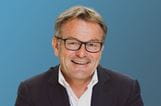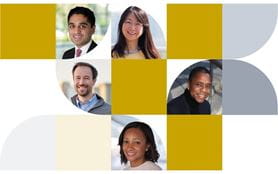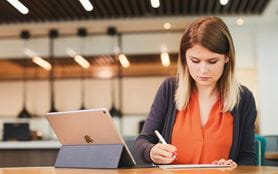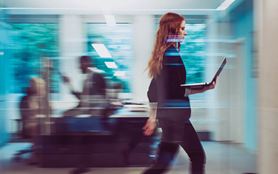Making headway in diversity and inclusion: managing through Covid-19
Related people
Headlines in this article
Related news and insights
Publications: 11 December 2023
Publications: 11 December 2023
Publications: 11 December 2023
Publications: 11 December 2023
Responsible AI: navigating the risks and embracing the possibilities
Wim Dejonghe and Gareth Price, our new senior leadership team, discuss the vital task of creating a more diverse and inclusive workplace, this year’s exceptional challenges, and prospects for 2021.

Q. 2020 saw a change in A&O’s senior leadership at a time when the world was going into lockdown due to the Covid-19 pandemic. Has this impacted on your priorities?
WD. Evidently Covid-19 has brought unprecedented challenges and the welfare of our people remains paramount. How Covid-19 will affect our business model has yet to be seen, but obviously our goal is to be as flexible as possible in order to maintain the safety of our people and to meet the evolving needs of our clients.
The danger in times of economic stress and social upheaval is that organisations become, unsurprisingly, so fixated on the business of survival that other very important issues drop down the list of priorities – or even fall off the agenda altogether. This could be a danger with the continuation of our diversity and inclusion (D&I) programme which is very much a strategic priority. Having made some real progress in D&I in recent years, we are determined to continue our work.
Q. Gareth, you’ve had a baptism of fire. How have you coped with becoming managing partner in a time of crisis?
GP. In the last week of February, the election results were announced and I was told that I was to be the next managing partner. The next morning, I was in the first Covid-19 planning meeting, which was a bit of a rude awakening. Then there was a handover period of about two months before I officially became the managing partner on 1 May. I’ve been working very closely with my predecessor, Andrew Ballheimer, and, of course, with Wim throughout this crisis, to ensure that we have a smooth transition and continuity. This has all been virtual: Wim and I have not been in the same country, let alone the same room, since January.
WD. We do miss the informal chat. Our offices are next to each other, so we would normally see each other for coffee in the morning, in the evening, in between meetings. Of course, none of that is happening now. We talk every day but it’s a bit more formal, rather than the informal chat in the corridor. So, for Gareth, not the easiest circumstances to get going in this new role.
Q. Gareth, do you see your appointment as signalling any change in strategy or emphasis?
GP. It’s a continuation. Our enterprise-level vision of being part of the global elite is determined by the partnership and hasn’t changed. This vision is client-led; we believe in global and we believe in elite, because they are the attributes that our clients of the future will wish to see in their trusted advisers. It’s the role of senior management to create and deliver a strategy that moves towards this vision while staying true to our values. In some respects, this strategy depends on market opportunities as not all growth can be organic and so Wim and I will need to continue to be flexible on the ‘how’.
Q. How has the economic recession affected A&O’s financial results?
GP. During the last financial year, ended 30 April 2020, our client revenue grew by GBP65 million (4%) to GBP1.69 billion, with strong performance across regions, especially the UK, the Middle East and large parts of Europe. Revenues grew in all practice areas, with Litigation, Tax and Real Estate having a particularly good year.
However, the outbreak of the pandemic in 2020 did start to impact our business and our profit before tax for the year would’ve been flat on the previous year but, after taking additional provisions related to the market uncertainty, was down 2.5% to GBP690m.
Given those challenges, we moved quickly to adapt to the uncertain environment. For example, we reduced outgoings, while increasing partner capital levels and deferring certain investments. As a result, we can face the continuing market uncertainty from a strong position.
Q. 2020 was the year in which racial injustice received wider publicity. As a leading professional firm, and major employer, how is A&O approaching this?
WD. The tragic and senseless deaths of George Floyd, Breonna Taylor and others have brought a heightened focus around the world this year to campaigns on the issue of systemic racism. Race and ethnicity is a big focus for us. I think we need to follow our successful approach to gender diversity, except that the challenge is probably bigger.
While the picture varies depending on the country – our regional D&I partners discuss this in more detail in Charting a course for greater inclusion – in the UK and U.S. we’re not where we want to be when it comes to the recruitment of black talent in particular, but our real challenge is inclusion because our retention rates for non-white people are worse than they are for white people with the trend, once again, even more pronounced when it comes to black talent. It’s morally and economically right that we have to make everyone feel welcome and that they can be themselves in the organisation. There’s a lot of work to do; it’s all about initiatives that dig deep to drive cultural change. It has to be a sustained effort and it takes a lot of time. But the progress we’ve made on gender diversity in the last three years proves you can make a difference.
More specifically, we’re using data, focus groups and external research to help us understand how we can make our ethnic minority employees feel more included.
We’re working to ensure minorities are better represented at senior levels and have implemented a successful mentoring scheme, as well as developing our networks and early career support for young colleagues from ethnic minorities. Also, we’re reviewing our recruitment processes to ensure any unconscious bias is eradicated.
Although 2020 has been a tough year on many levels, the response of our people has been amazing and carried us through.
Q. More generally, why does equality matter for A&O and how much progress are you making?
WD. Our long-term success and our ambitions to lead our industry as an elite and progressive global firm depend on us continuing to push all aspects of our D&I agenda forward as strongly as we can.
We’re a talent business and we need to make sure we can recruit from the entire population as talent knows no borders. This means we need to create a level playing field for diverse talent. We need to be able to recruit the best people and provide an inclusive environment in which people wish to work.
Only by doing this with real energy can we ensure that people of huge talent can thrive at A&O – regardless of their gender, ethnicity, disability, religious belief, social background or sexual orientation.
On gender, we’ve made good progress and 45% of our partner promotions were women in 2020, which is a significant improvement on just a few years ago. We’ve also embedded accountability for achieving our gender diversity goals during the year, refining our processes and supporting women from the earliest stages of their careers.
GP. Showing how our actions can make a difference, we’re pleased that on the third strand of D&I – creating an inclusive working environment for our LGBTQ+ community – we’ve had some success. For the third year running, we were named by Stonewall – a leading LGBT equality charity – as one of only 14 Top Global employers for the working environment that we provide for our colleagues. Additionally, in the U.S., Yale Law Women recognised A&O in its annual Top Firms Report for excellence in both hiring practices and LGBTQ+ representation.
This year we’ve improved our ranking in the Social Mobility Employer Index, for the second consecutive year, demonstrating the firm’s commitment to social mobility. The index ranked A&O in the Top 30 employers in the UK, by looking at how we interact with young people through initiatives like Smart Start and A&O Accelerate, our attraction and recruitment process with programmes like Lawyer of the Future and by taking part in third party research by looking at how socio-economic backgrounds affect progression to partnership. For us, social mobility is not just about getting in but how our people get on, and that means evaluating our processes and understanding why these barriers exist.
WD. The important role that Gareth and I can play is talking about the intersectionality social mobility has with other areas of D&I such as race and how more than ever it’s important to be able to bring your true self to the workplace.
Q. Returning to Covid-19, how did the firm adjust so that you could continue to serve clients?
WD. We had a Covid-19 working group which drove the initiatives in terms of being close to the client, understanding their needs and organising a coordinated client approach that was very successful. We’ve tried to play to our strengths by using technology and having an integrated offering between offices and practice groups, emphasising what Covid-19 means for the client. So that’s been absolutely amazing.
GP. Although 2020 has been a tough year on many levels, the response of our people has been amazing and carried us through. Our incredible non-legal staff got the firm from a traditional bricks-and-mortar firm to a virtual firm over a weekend. Our lawyers really stepped up too. This was not just about direct delivery for clients but also supporting each other in such difficult circumstances.
As a result, we were able to deepen relationships with and continue to serve our clients, which is ultimately our purpose.
Q. What have you done to look after your people?
GP. Throughout the crisis, the welfare of A&O’s people has been our main priority. Most of our people worked from home and we’ve encouraged them to continue doing so for as long as possible, putting the emphasis on individual choice. The reopening of our offices has depended on the state of the pandemic locally. Looking forward, we intend to offer staff greater flexibility in how they use the office even after the Covid-19 crisis passes.
We’ve seen the impact of homeworking on the traditional breadwinner model. Even though it’s an outdated model, it’s one that’s difficult to change.
It’s still certainly the case that in a male/female nuclear family, women are generally shouldering more of the childcare burden, although this is changing and moving in the right direction. The limited availability of childcare during the pandemic has put more pressure on all our people. As a result, we’re offering additional coaching to our staff who are parents, as well as our managers, so that they can understand and be more supportive of family time.
Of course, working from home and having very limited social interaction creates challenges for our people. A key objective was to overcome these challenges in terms of team spirit, mental health, training and making sure our people get opportunities to do interesting work.
As a partnership, we wish to do all we can to ensure that all our people are fit and healthy – both mentally and physically. Through our Minds Matter programme, we’re fostering a culture where everyone can flourish and deliver sustainable performance. We’ve launched ‘Mindful Leader’ training for partners in 2020; it’s designed to educate partners about how to support the mental health of their teams.
WD. Although all areas have performed well in these trying times, I’d like to give particular credit to our IT teams for making sure people were set up properly to work from home and to our HR teams in terms of caring and looking after our people, and making life as normal as possible given the challenges that we have around us.
Q. How did working from home affect your ability to conclude complex transactions?
GP. Even after lockdown, we continued to deliver transformational transactions. For instance, we advised Liberty Global on its GBP31bn deal with Telefónica, to merge Virgin Media and O2 to create a business serving 46 million video, broadband and mobile subscribers. More than 50 of our lawyers worked remotely to conclude this massively complex deal, which was finally announced in May.
This continuity of client service by our lawyers was made possible by the outstanding efforts of our non-legal staff – it’s a real testament to our one team approach.
Our Advanced Delivery & Solutions teams are a key part of providing the innovative solutions these times require. For example, within three weeks of the UK lockdown in March, the aosphere team* had devised an e-signature product to facilitate our clients’ signing needs in a remote environment.
Q. Has the pandemic influenced the firm’s long-term strategy in any way?
WD. During 2020, we made strategic hires in the U.S., especially in Litigation, while remaining open to the possibility of a merger. The U.S. continues to be a priority because there are two legal systems that are globally relevant – English law and U.S. law. We continued to invest in Asia, which will be the world’s fastest-growing region in the next 15 years. From a sector perspective, we focused on building our capabilities in private equity, including infrastructure and debt funds, recognising its growing role in financing the global economy.

Q. How about Advanced Delivery & Solutions, where you’ve led the market in developing innovative ways of working?
WD. It was another year of growth for Advanced Delivery & Solutions, building on 2019’s notable advances, with a revenue increase of 15%. This suite of key offerings across technology, insight and new ways of working will be in even greater demand over the next few years, as clients seek more value for money.
Our long-term perspective has given us a lead on our competitors and we’re transforming the way legal services are delivered through new solutions, technology and resourcing.
Illustrating how this makes a difference, we advised Santander on the first end-to-end blockchain bond. Santander was supported by Nivaura, a Fintech company on our Fuse tech innovation platform that digitises and automates key capital markets processes. The USD20m pilot transaction is settled on the public Ethereum blockchain.
In another notable success, the Markets Innovation Group launched IBORMatrix, an end-to-end solution that uses big data to help banks transition contracts away from the LIBOR rate to new interest rates.
Q. With regard to environmental sustainability, what were the highlights of 2020?
GP. A silver lining of the pandemic was that working from home without business travel helped to cut the firm’s CO2 footprint. Beyond this, we continued to demonstrate our commitment to environmental sustainability by seeking to reduce our most material sources of CO2 emissions and supporting UN Sustainable Development Goal 13 – Climate Action.
Just over 75% of our global electricity consumption was supplied from renewable sources in 2019. Our global carbon footprint decreased by 5%, despite an increase in employee numbers and occupied floor space of 2% globally.
From now on, we plan to offset all our global residual CO2 emissions, including aviation emissions. Additionally, our plans to retain flexible working practices and minimise flights will significantly reduce CO2.
Q. Was the firm’s pro bono and community investment work affected by the pandemic?
WD. We adapted our programmes to respond to the needs of our pro bono and community investment clients, whether by taking projects online or developing new areas of work to provide more support throughout this period. Our lawyers delivered 120 hours of pro bono and community investment work every day last year, amounting to nearly 44,000 hours worldwide.
We extended our partnership with Hope and Homes for Children to July 2021, beyond the planned two-year time frame of September 2020, to support the charity at this challenging time.
There has always been strong firm-wide engagement, and alumni engagement, with our global charity partners. It was great to get people involved in an A&O virtual ‘Around the World Challenge’ fundraiser during lockdown.
It’s morally and economically right that we have to make everyone feel welcome and that they can be themselves in the organisation.
Q. What role do you see the Alumni Network playing in these testing times?
WD. We’re delighted that our Alumni Network continues to grow – it’s up almost a fifth to around 16,000 members at the end of 2020. That can only be good for A&O and our alumni. The value of relationships and networks is even more important at a time like this, as some of our alumni coach our staff and some of them are clients. Our Alumni Network is actively progressing ways to reach out to bring people together and we’ll offer whatever assistance we can during these times.
Naturally, the pandemic means we’ve had to cancel face-to-face events this year, but I hope they’ll be re- established in 2021. However, the continuing virtual events on NED opportunities, mentoring, coaching and thought leadership show the network’s huge value, and it’s been fantastic to have the support of many of our alumni including Anne Baldock, Guy Beringer, David Morley, Nomita Nair and Philip Wood.
Q. How do you see 2021?
WD. 2021 will, undoubtedly, bring uncertainty. However, A&O is a financially conservative firm with a strong cash position and we’ll continue to be committed to our long-term strategic vision. Being a global elite law firm, with diversification across both geography and practice area, gives us confidence in our resilience.
GP. 2020’s incredible performance is a consequence of our vision and a testament to the contributions of all of our people who are collaborating to support our clients. With the way we’ve already adapted, we have reasons to feel positive about 2021 and beyond!
Wiring objectivity into graduate recruitment
The most effective way to enhance diversity results in recruiting graduates is to have a compelling brand that attracts a wide range of talent to apply, clarity around the qualities that our future talent needs to have, and an objective assessment approach that considers candidates for their potential, not just their past experience.
Over the past three years, A&O has introduced a new employer brand globally and a new ‘scenario-based’ interviewing and assessment approach for graduate recruitment, leveraging the latest assessment technology to support objective decision-making. As part of the new process, candidates may undergo an interactive video-based situational judgement test which assesses how they would react to realistic situations they could encounter in the workplace, allowing them to demonstrate qualities such as creative thinking and resilience.
Approximately 350 interviewers from 22 offices around the world have been trained in the new interviewing approach since 2018 and around 10,000 candidates have taken the test.
Interviewers have noted three key benefits: a more consistent process, more objective hiring decisions and more insight into a candidate’s potential. As a consequence, the diversity of our graduate intake has risen in a number of locations.

Download the yearbook
Read our full Alumni Yearbook 2020
Download PDF



